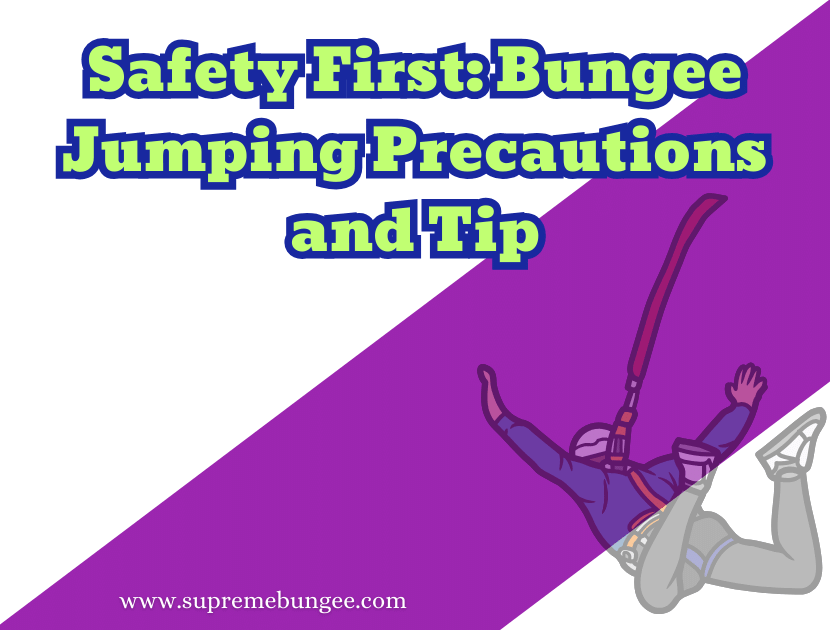Safety First: Bungee Jumping Precautions And Tips

As humans, we have always been fascinated by the idea of defying gravity and experiencing the rush of adrenaline. Bungee jumping, a thrilling adventure sport that involves leaping off a tall structure while attached to an elastic cord, perfectly encapsulates this desire. It is an activity that promises an unforgettable and exhilarating experience. However, it is important to remember that bungee jumping can be an extreme sport that carries risks. In order to ensure a safe and enjoyable bungee jumping experience, there are a number of precautions and tips that you should be aware of.
Understanding Bungee Jumping
Before we delve into the safety precautions and tips, let’s first understand the basics of bungee jumping. This extreme sport involves participants jumping from a height while attached to a long elastic cord. The cord is designed to stretch and rebound, ensuring a safe and controlled descent. Bungee jumping can be done from various platforms such as bridges, skyscrapers, and helicopters, providing thrill-seekers with a wide range of options.
Safety is Paramount
When it comes to bungee jumping, safety should always be the top priority. Here are some essential precautions to keep in mind before taking the leap:
1. Choose a Reputable Bungee Jumping Company
Selecting a well-established and reputable bungee jumping company is crucial. Do thorough research and read reviews to ensure that the company has a good safety track record. Look for certifications and licenses that demonstrate their commitment to safety standards.
2. Follow Age and Weight Restrictions
Bungee jumping is not suitable for everyone. Most companies have age and weight restrictions in place to ensure the safety of participants. Make sure you meet the requirements before planning your jump. It’s better to be safe than sorry!
3. Get a Medical Check-Up
Before attempting a bungee jump, it’s important to undergo a medical check-up. Ensure that you are physically fit and do not have any pre-existing health conditions that could be aggravated during the jump. Consult with a healthcare professional to evaluate your suitability for this extreme sport.
4. Double-Check the Equipment
Inspecting the bungee jumping equipment is essential for your safety. Check that the cords, harnesses, and helmets are in good condition and regularly maintained. Any signs of wear or damage should be reported to the jump operator immediately. Remember, your life is literally hanging by a thread, so make sure that thread is strong and reliable.
Preparing for the Jump
Once you have taken care of the necessary safety precautions, it’s time to prepare yourself mentally and physically for the bungee jump. Follow these preparatory tips to maximize your enjoyment and minimize any potential risks:
1. Dress Appropriately
Wear comfortable clothing that allows for freedom of movement. Avoid loose accessories and jewelry that could get tangled in the equipment. Closed-toe shoes with a secure fit are recommended to prevent any accidents during the jump.
2. Listen to the Briefing
Pay close attention to the instructions given by the bungee jumping instructor during the pre-jump briefing. They will explain the correct jumping technique, provide safety guidelines, and answer any questions you may have. Follow their instructions meticulously to ensure a safe jump.
3. Know What to Expect
Bungee jumping can be an overwhelming experience, especially for first-timers. Familiarize yourself with the sensations you may encounter during the jump, such as the feeling of weightlessness and the sudden deceleration when the cord stretches and rebounds. Knowing what to expect can help ease any anxiety or fear.
4. Stay Hydrated
Staying hydrated is important before and after the jump. Dehydration can lead to a decrease in focus and concentration, making it more difficult to follow safety instructions. Remember to drink plenty of water to keep your body hydrated and energized.
Frequently Asked Questions (FAQs):
Does bungee jumping carry any risks?
Bungee jumping, like any extreme sport, does carry risks. However, if proper safety precautions are followed and equipment is well-maintained, the risks can be minimized significantly.
How can I overcome my fear of bungee jumping?
Overcoming fear is a personal journey. Start by visualizing your jump and the exhilarating feeling it will bring. Remind yourself of the safety measures in place and trust the professionals guiding you. Take small steps and gradually expose yourself to heights and adrenaline-inducing activities.
Is there an age limit for bungee jumping?
Most bungee jumping companies have a minimum age requirement of 18. However, some may allow younger participants with parental consent. It’s important to check the age restrictions specific to the company you choose.
Can I bungee jump if I have a fear of heights?
Bungee jumping can be an effective way to conquer a fear of heights. With the proper safety measures in place and professional guidance, many people find that the experience helps them overcome their fear and gain a newfound sense of confidence.
Are there any health conditions that would prevent me from bungee jumping?
Certain health conditions, such as heart problems, high blood pressure, epilepsy, and pregnancy, may prevent individuals from participating in bungee jumping. It is essential to consult with a medical professional and disclose any pre-existing health conditions before attempting this extreme sport.
In conclusion, while bungee jumping is undeniably exciting and thrilling, it is crucial to prioritize safety above all else. By choosing a reputable company, following age and weight restrictions, undergoing a medical check-up, and inspecting the equipment, you can minimize the risks associated with this extreme sport. Additionally, dressing appropriately, listening to the briefing, knowing what to expect, and staying hydrated will ensure a smooth and enjoyable bungee jumping experience. So, if you’re ready to take the leap, remember to prioritize safety first and dive into an adventure of a lifetime!
